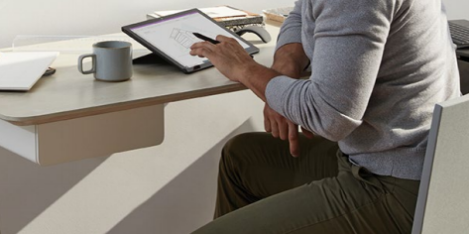To provide the best experiences, we use technologies like cookies to store and/or access device information. Consenting to these technologies will allow us to process data such as browsing behaviour or unique IDs on this site. Not consenting or withdrawing consent, may adversely affect certain features and functions.
The technical storage or access is strictly necessary for the legitimate purpose of enabling the use of a specific service explicitly requested by the subscriber or user, or for the sole purpose of carrying out the transmission of a communication over an electronic communications network.
The technical storage or access is necessary for the legitimate purpose of storing preferences that are not requested by the subscriber or user.
The technical storage or access that is used exclusively for statistical purposes.
The technical storage or access that is used exclusively for anonymous statistical purposes. Without a subpoena, voluntary compliance on the part of your Internet Service Provider, or additional records from a third party, information stored or retrieved for this purpose alone cannot usually be used to identify you.
The technical storage or access is required to create user profiles to send advertising, or to track the user on a website or across several websites for similar marketing purposes.
 Employees could save over £2,200 a year and ‘get back’ 98 mins a day if companies adopted a ‘Work Near Home’ model for offices in the future, claims research from workspace company, The Instant Group and site location company, Hickey. For companies that adopt this approach, they could save upwards of 23 percent by utilising a “Hub and Spoke” model that removes reliance on city centres for office locations. (more…)
Employees could save over £2,200 a year and ‘get back’ 98 mins a day if companies adopted a ‘Work Near Home’ model for offices in the future, claims research from workspace company, The Instant Group and site location company, Hickey. For companies that adopt this approach, they could save upwards of 23 percent by utilising a “Hub and Spoke” model that removes reliance on city centres for office locations. (more…)








 A new study on recruitment and workforce trends has crowned London as the world’s most desirable city to work in, with the UK capital holding onto the top spot, despite uncertainty around Brexit and the ongoing Covid-19 pandemic.
A new study on recruitment and workforce trends has crowned London as the world’s most desirable city to work in, with the UK capital holding onto the top spot, despite uncertainty around Brexit and the ongoing Covid-19 pandemic. 
 People working from home during the pandemic are experiencing higher levels of stress and withholding mental health conditions from their employer, for fear of a negative impact on career progression, according to a new
People working from home during the pandemic are experiencing higher levels of stress and withholding mental health conditions from their employer, for fear of a negative impact on career progression, according to a new 
 Progress for women in work could be back at 2017 levels by the end of this year as a result of the COVID-19 pandemic, according to analysis conducted for
Progress for women in work could be back at 2017 levels by the end of this year as a result of the COVID-19 pandemic, according to analysis conducted for 
 Almost one year on and a third lockdown in, it seems the pandemic has Brits re-assessing and taking more control of their work-life balance, however not everyone seems to be so successful. A
Almost one year on and a third lockdown in, it seems the pandemic has Brits re-assessing and taking more control of their work-life balance, however not everyone seems to be so successful. A 
 The feelings of isolation being experienced by employees is the biggest concern IT and cybersecurity teams have around home working, say almost one third (31 percent) of respondents to the latest Twitter poll run by
The feelings of isolation being experienced by employees is the biggest concern IT and cybersecurity teams have around home working, say almost one third (31 percent) of respondents to the latest Twitter poll run by 
 More than half of financial institutions say they expect to have more ‘gig economy’ based employees over the next three to five years, according to PwC’s report,
More than half of financial institutions say they expect to have more ‘gig economy’ based employees over the next three to five years, according to PwC’s report, 
 UK employers are reporting their strongest employment intentions in a year, the latest
UK employers are reporting their strongest employment intentions in a year, the latest 
 Research released by
Research released by 
 r workplace digital transformation and the urgent shift to remote working has seen the world experience two years of digital transformation in two months. New research from
r workplace digital transformation and the urgent shift to remote working has seen the world experience two years of digital transformation in two months. New research from 
 One important concept the pandemic has taught us is that irrespective of where we work and whatever form the future workplace takes, our brand must remain strong. With much of our workforce now working from home, how do we bridge the gap between corporate and home life? As head offices re-form into social hangout hubs, and dining tables become makeshift desks, one message is loud and clear – connection with and delight in a brand is everything. From our internal talent and culture, and supply partnerships, to external customer persona, we must strengthen our culture both inside and out.
One important concept the pandemic has taught us is that irrespective of where we work and whatever form the future workplace takes, our brand must remain strong. With much of our workforce now working from home, how do we bridge the gap between corporate and home life? As head offices re-form into social hangout hubs, and dining tables become makeshift desks, one message is loud and clear – connection with and delight in a brand is everything. From our internal talent and culture, and supply partnerships, to external customer persona, we must strengthen our culture both inside and out. 








March 5, 2021
A shift from competition to community has never been more important
by Hannah Koole-Browne • Business, Comment